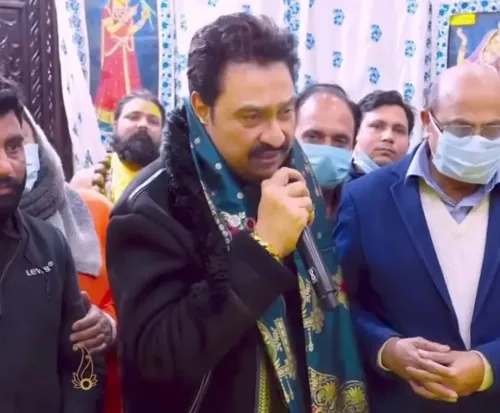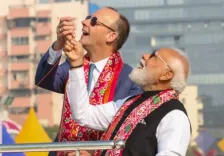DMK’s Student Wing Holds Significant Protests Across Tamil Nadu Against Hindi Enforcement

Synopsis
Key Takeaways
- Large protests organized by DMK’s student wing.
- Protesters demanded withdrawal of UGC draft policy.
- Accusations against BJP-led Union government.
- Tamil Nadu’s commitment to two-language policy reaffirmed.
- Financial allocations linked to NEP under dispute.
Chennai, Feb 25 (NationPress) The student faction of the ruling Dravida Munnetra Kazhagam (DMK) organized extensive protests throughout Tamil Nadu on Tuesday, denouncing the Centre’s purported imposition of Hindi and its ramifications on the state’s educational framework.
Demonstrations took place in various regions, including Saidapet, Tiruvannamalai, Namakkal, and Villupuram, where protestors called for the retraction of the University Grants Commission’s (UGC) draft policy and the National Education Policy (NEP), which mandates a three-language system.
The protesters accused the Bharatiya Janata Party (BJP)-led Union government of seeking to undermine Tamil Nadu’s historic two-language policy of Tamil and English.
Numerous DMK-associated groups, including the party’s youth wing and members of the Marumalarchi Dravida Munnetra Kazhagam (MDMK) and Manithaneya Makkal Katchi, participated in the demonstrations, escalating the ongoing strife between Tamil Nadu and the Centre over educational policies.
The Tamil Nadu government has consistently accused the Union Ministry of Education of withholding vital funds for state-sponsored educational initiatives as a method of coercing compliance with the NEP.
Deputy Chief Minister Udhayanidhi Stalin has categorically dismissed the three-language policy, reaffirming Tamil Nadu’s dedication to its established two-language system.
In response, Union Education Minister Dharmendra Pradhan criticized Chief Minister M.K. Stalin, accusing him of politicizing progressive educational reforms.
Pradhan urged the DMK government to consider the advantages of the NEP for students instead of opposing it for political motives.
A significant point of contention in this conflict is the distribution of funds under the Samagra Shiksha Abhiyan (SSA).
Chief Minister M.K. Stalin has reached out to Prime Minister Narendra Modi, requesting the release of ₹2,152 crore in SSA funds, which he claims have been unjustly associated with the PM SHRI scheme.
CM Stalin contended that SSA and PM SHRI are distinct centrally-sponsored programs, and withholding funds infringes upon the principles of cooperative federalism.
He further accused the Union government of leveraging financial distributions to pressure states into adopting centrally dictated policies, warning that such actions harm students and teachers in Tamil Nadu.
He implored PM Modi to guarantee the unconditional release of SSA funds, independent of NEP stipulations.
The three-language formula continues to be a highly contentious topic in Tamil Nadu, with not only the DMK but also the state’s principal opposition party, the All India Anna Dravida Munnetra Kazhagam (AIADMK), endorsing the two-language policy.
As the political deadlock over language policy and educational funding intensifies, the DMK government remains unwavering in its opposition to what it sees as an attempt to undermine Tamil Nadu’s linguistic and educational autonomy.










